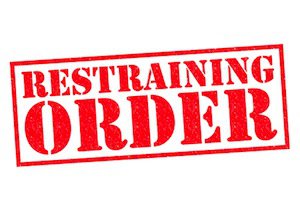Automatic Restraining Order: Massachusetts Supplemental Probate and Family Court Rule 411

Upon filing a Massachusetts complaint about divorce, you will receive a summons that you must have served on your spouse. The summons serves several purposes. 1) It informs the non-filing spouse that you have filed for divorce. 2) It then instructs your spouse to file an answer to the complaint with the Court within twenty (20) days as well as serve you with a copy of it. 3) It provides notice that an automatic restraining order has gone into effect against both the filing and non-filing spouse. But what does the Rule 411 Automatic Restraining Order mean?
Pursuant to Massachusetts Supplemental Probate and Family Court Rule 411, once a party has filed either a complaint about divorce or a complaint about separate support, an automatic restraining order goes into effect. Specifically, the order goes into effect for the moving party as soon as he or she files the complaint while it does not go into effect for the opposing party until he or she is served with the complaint. Once in effect, the automatic restraining order remains in place until the conclusion of the matter, unless modified by agreement of the parties or an order from the court.
So what does the automatic restraining order do? The order prevents either party from taking actions that would negatively affect the marital estate and his or her spouse. Specifically, the automatic restraining order forbids either party from:
- Selling, transferring, encumbering, concealing, assigning, removing or disposing of any property belonging to or acquired by either party except as required for a) reasonable living expenses; b) in the ordinary and usual course of business; c) in the ordinary and usual course of investing; d) payment of reasonable legal attorney’s fees and costs in connection with the action; e) written agreement of the parties; or f) by order of the court;
- Incurring further debts that would burden the credit of the other party;
- Changing, either directly or indirectly, the beneficiary of any life insurance policy, pension or retirement plan, or pension or retirement investment account, except with the written consent of the other party or by order of the court under Automatic Restraining Order; and
- Causing, either directly or indirectly, the other party or the minor children to be removed from coverage under an existing insurance policy, including medical, dental, life, automobile, and disability insurance. The parties must maintain all insurance coverage in full force and effect under Rule 411.
If either party violates the automatic restraining order, they may be subject to a finding of contempt.
There are many facets of the divorce process, like the automatic restraining order, that seem confusing at first. If you are experiencing a divorce and need to hire an attorney or just need some questions answered, contact an experienced Boston divorce attorney today.